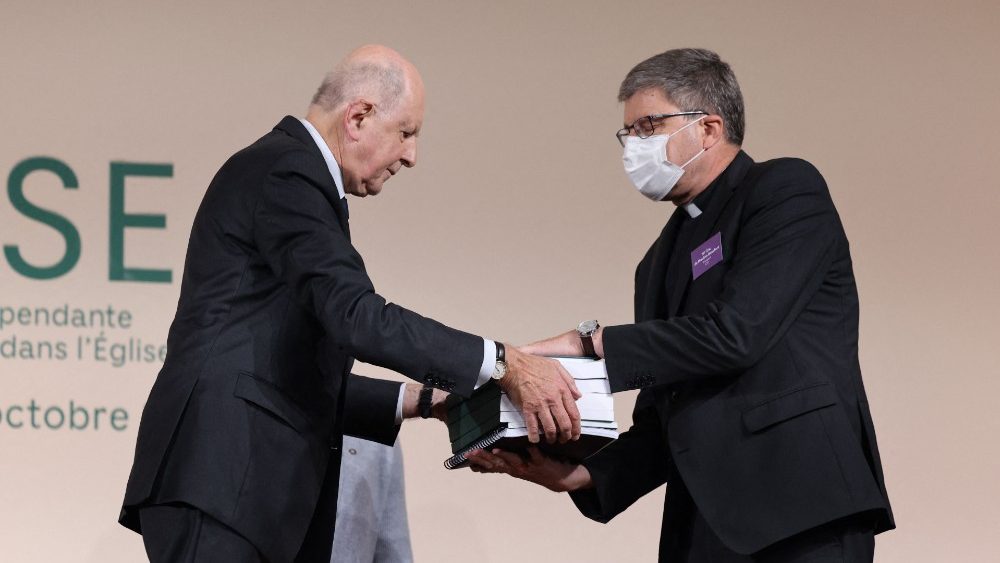After the shock caused by the revelations of the CIASE (Independent Commission on Sexual Abuse in the Church) of the exhorbitant number of sexual abuses (more than 300,000) on minors in the Church since 1950, almost two months later, criticisms are slowly emerging.
It all began at the beginning of the week. Eight eminent members of the Catholic Academy of France, created in 2009 to ensure better visibility of the "intellectual production linked (...) to Catholicism," sent a letter of about fifteen pages to Bishop Éric de Moulins-Beaufort, president of the CEF, and to Bishop Celestino Migliore, apostolic nuncio to France, direct representative of the Pope. The document is signed by a large part of the leadership of the Academy, such as Hugues Portelli (president), Jean-Dominique Durand and Yvonne Flour (vice-presidents) and Jean-Luc Chartier (secretary general).
First of all, the document denounces a questionable evaluation of the number of victims, since two studies had been carried out with very different results: 27,000 victims at the most by the researchers of the EPHE (École Pratique des Hautes Etudes) by extrapolating data from archives and surveys, and 330,000 by the researchers of the INSERM from an Internet survey of 24,000 people, to which 171 people had replied that they had been abused, which became, by a very questionable extrapolation, 330,000.000 by INSERM researchers from an Internet survey of 24,000 people, to which 171 people had responded that they had been abused, which became by a very questionable extrapolation 330,000 when extended to the national adult population. This 330,000 figure was the only one retained and the EPHE study was discarded without explanation. From this huge figure, CIASE was able to posit an explanation based on the "systemic" nature of the plague, inherent in the nature and functioning of the "institution" of the Church.
From then on, the most radical recommendations were formulated, questioning the spiritual and sacramental nature of the Catholic Church, attributing to it an image of intrinsic corruption. Thus, the "recommendations" called for a "revision" of confession, absolution, Catholic sexual morality, "the hierarchical constitution of the Church", "the concentration of the powers of order and government in the hands of one person", and also to invoke the civil and social responsibility of the Church because of the "systemic" nature of this scourge (even when the consultation of juridical specialists on the question had dissuaded them), to abolish the secrecy of confession, etc.
Dissensions have torn the Catholic Academy in recent days following these criticisms that question "the methodological weaknesses and sometimes dubious analyses" of the CIASE report. Although the document was not presented as the official position of the Academy but the personal opinion of some of its members, several members of the Academy have resigned from this institution. Eric de Moulins-Beaufort himself, president of the French Episcopal Conference, and Sister Véronique Margron, president of the Conference of Religious of France (Corref). This new document disqualifies the position they had previously taken publicly, of unreserved acceptance of the conclusions of the CIASE.
However, the initiative of the protesting academics is only the tip of a broader movement of criticism of the Sauvé report. A wave that is reaching the highest levels of the Church. The gesture of the eight academics would have provoked, according to some media, the postponement sine die The Vatican has cancelled a meeting between the Pope and the members of the Sauvé Commission initially scheduled for December 9 due to the Pope's scheduling problems, it was reported.
In the midst of this confusing climate, the Church in France has recently received with dismay the resignation of the Archbishop of Paris, Michel Aupetit, from his position at the hands of the Pope, provoked by an intentional leak to the press of an accusation of irregularities in government and of having had intimate relations with a woman nine years ago. Archbishop Aupetit has denied the allegations.
Pope Francis accepted the resignation of Archbishop Michel Aupetit from his pastoral office as head of the Archdiocese of Paris on Thursday, December 2. In turn, the Holy Father has appointed Archbishop Georges Pontier, Archbishop Emeritus of Marseille, Apostolic Administrator of Paris.





 Sauvé Report: the French episcopate acknowledges the Church's institutional responsibility
Sauvé Report: the French episcopate acknowledges the Church's institutional responsibility





